-
What We Do
- WHERE WE WORK
-
About Us
 Welcome Message from Carol Jenkins
Welcome Message from Carol JenkinsFor more than 90 years, World Learning has equipped individuals and institutions to address the world’s most pressing problems. We believe that, working together with our partners, we can change this world for the better.
On my travels, I’ve had the opportunity to meet with many of those who have joined us in this mission. In Baghdad, we’ve trained more than 2,300 Iraqi youth who are already giving back at home. In London, our partners in the TAAP Initiative strongly believe that we are all responsible to practice inclusion. And in Vermont, our Experiment in International Living and School for International Training participants prove every day that they have the tools and the determination to change the world.
Please join us in our pursuit of a more peaceful and just world.
- Get Involved
Media Center > Story
5 Amazing Innovations From the WiSci STEAM Camp
August 13, 2018
After two weeks of learning how to code, build autonomous robot cars, create accessible apps, and live together with girls from five different countries, the 2018 Women in Science (WiSci) Girls STEAM Camp drew to an innovative end yesterday.
Teams of WiSci campers have spent the past week designing creative solutions to problems in their communities, ranging from waste and environmental degradation to everyday problems in girls’ lives. Their ideas were astounding. They’ve come up with ways to make cars cleaner and keep girls safer.
At the closing ceremony, esteemed judges from the U.S. Department of State, Intel, Girl Up, and the Namibia University of Science and Technology presented four WiSci teams with awards, which were also made possible with the support of Cheryl Lewy, vice chair of World Learning’s Board of Trustees, and her husband Glen. These were given out in the categories of most innovative, best presentation/pitch, most technical rigor, and best all-around projects.
Want to learn more about how these campers are going to change the world? Here’s a look at five amazing projects that reveal the diverse possibilities of STEAM:
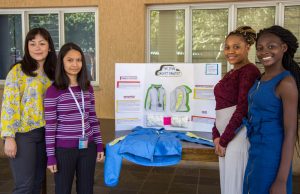
The Jeng Jacket Project
Elisa, Noelia, Grace, Johanna
What if your jacket could keep you warm and safe? That’s what these four girls from the U.S. and Namibia asked themselves when they started to work on their final WiSci projects. While brainstorming ideas, they discovered they all had a common problem: whether they were staying late for clubs or walking long ways to school in early hours, they all had to walk alone in the dark sometimes. So they designed the Jeng Jacket.
This jacket comes outfitted with heating pads that activate as you move to keep you warm, reflective velcro (which can be removed for washing), and an alarm that sounds when you pull a string. In their presentation, the girls explained that the alarm — which sounds like a siren — is designed to scare off anyone who might try to attack a girl. They had a lot of fun building it together and plan to keep working on it even after WiSci. “We really hope we can make this into a reality,” Grace said.
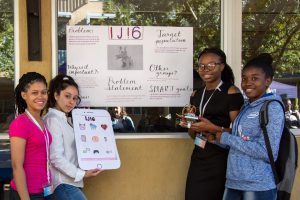 lJ!6 (“Girl” Upside-Down)
lJ!6 (“Girl” Upside-Down)
Jo-Ann, Leslie M., Leslie D., Hendrina
(Winners of “Best All-Around” project)
Team IJ!6 set out to solve a problem that was very close to their hearts: they wanted to provide service dogs to people who can’t see — and do so at a low cost. As Leslie M. explained during her presentation, years ago she and her brother were in a car accident that left him blind. Her mother wasn’t able to afford a service dog, as they can cost more than $15,000.
So IJ!6 created a robotic service dog made of cheap materials such as plywood and silicone as their WiSci project. “We invented what I personally wish had been invented,” Leslie M. said. They named the robot IJ!6 — the word “girl” written upside-down — to challenge the idea that only men can become engineers. And, to this team, there was no question as to their motivation. “The reason why this is important is because we care,” Jo-Ann said.
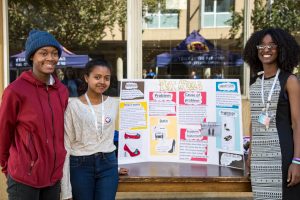 Flat Heels
Flat Heels
Emily, Bezawit, Marye, Tatiana
(Winners of “Most Innovative” project)
“Do you wear heels?” Emily asked the judges and other onlookers during her presentation. “Do you feel uncomfortable wearing them the whole day? Do you wish there was an easier way to change from flats to heels?” Team Flat Heels had a solution to this problem that most women will find familiar. Their project was a high heel that can convert into flats at the touch of a button.
Bezawit and Marye said the inspiration for the Flat Heel came from their performance in Ethiopia’s culture night at WiSci. They were both pulling double-duty as presenters and dancers and needed to quickly change out of their heels.
In their pretotype design for Flat Heels, the team envisions the shoes will come outfitted with a gas spring in the heel that can rise into a high heel or compress into a flat. The mechanism would be operated by a tiny arduino computer that a user could activate from a cell phone app. They’re hoping to turn this design into a reality when they get home — and judging from the responses from their fellow WiSci participants, there’s certainly a market for it. “Everyone said they would buy it,” Marye said.
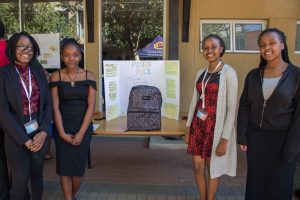 Future Pack
Future Pack
Daniella, Rakkel, Marina, Faith
Backpacks can be hard on your back — as the girls from this WiSci project team know well from years of commuting to their schools in eSwatini, Kenya, and Namibia. They wanted to build a better, more lightweight, backpack that will not only make for easy wearing but also prevent back pain for years to come.
They designed the Future Pack, a backpack outfitted with a system that distributes helium evenly throughout to reduce the bag’s weight by up to 25 percent. As with all the projects, the team faced significant challenges: “We were aiming to reduce the weight of the bag, but had to use a heavy helium canister,” Faith explains. But the team worked to find a way to compensate for that weight and are proud of their end result. “I feel like a scientist,” Faith said.
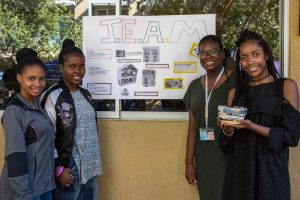 Just Expressing Artistic Motives (J.E.A.M.)
Just Expressing Artistic Motives (J.E.A.M.)
Joysy, Evandra, Angela, Miracle
Miracle was disappointed when the funding for her school’s art program was cut. She and her fellow art students had started working on a mural but ran out of paint and couldn’t afford more to finish it. But it turned out they weren’t done with art: instead, her teacher came in with magazines and other recyclable materials to transform into bowls and other forms of art..
Team J.E.A.M. — which also represents the girls’ initials — love both art and the environment and were excited to combine their passions into this upcycling project that transforms recyclable materials into art. When they return to their homes in the U.S. and Namibia, they’re planning to create dropboxes in their communities where they can leave recyclable materials for others to use. They’re also creating a Facebook page offering tutorials on how to turn cardboard, water bottles, and spoons into dollhouses, toy monsters, and windchimes.
The girls said they were inspired by their time at WiSci: “We’re here to express ourselves as well as learn, so we used our technology to allow people to express their artistic forms and share it with other people,” Miracle said.
Women in Science (WiSci) Girls STEAM (Science, Technology, Engineering, Art & Design, and Mathematics) Camp is a private public partnership (PPP) between the U.S. Department of State’s Secretary’s Office of Global Partnerships, UN Foundation’s Girl Up Initiative, Intel Corporation, and Google. In 2018, the camp will bring approximately 100 high school girls from the African continent and the U.S. together for 13 days in Namibia to explore the STEAM fields and access mentorship opportunities and leadership training.





